Home is Not a Place
Polley and I took stock of all the “must do’s” we have done in recent months and decided it was time to pursue the “want to’s.” It was her idea to spend a few days in the Adirondack Mountains, my Bronx home away from home, my sanctuary from the unstable vicissitudes of urban elementary school cultures.

My father would drive the family from the congested three room Bronx apartment redolent with automobile exhaust and Mrs. Poderecki’s cabbage soup in Apt. 4D, to the Tupper Lake area where the air was so clean inhaling it felt like drinking ice cold water from a mountain stream. The trip up the New York Thruway and Route 9 took us from scenes of city buses belching black smoke  and cough-splattered dirty white opaque windows that masked the riders, to lakes which so clearly mirrored the surrounding mountains and trees that one became disoriented as to which was real and which was the reflection.
and cough-splattered dirty white opaque windows that masked the riders, to lakes which so clearly mirrored the surrounding mountains and trees that one became disoriented as to which was real and which was the reflection.
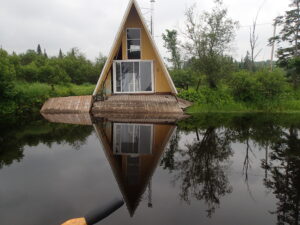
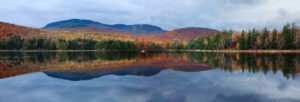 Even though Tupper Lake did not have the entertainment gravitas of Saranac Lake or the panache of Lake Placid, we enjoyed shopping in the IGA and having a breakfast of eggs, pancakes, hash browns, and corn beef hash at the Lumberjack restaurant.
Even though Tupper Lake did not have the entertainment gravitas of Saranac Lake or the panache of Lake Placid, we enjoyed shopping in the IGA and having a breakfast of eggs, pancakes, hash browns, and corn beef hash at the Lumberjack restaurant. 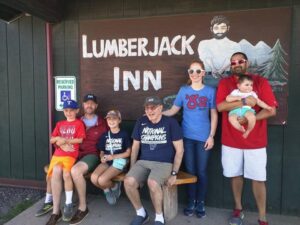 The locals were kind and helpful and pleasant in conversation. My brother Jimmy and I would swim in Little Wolf Pond and catch bullheads in the evening. Most of all, we inhaled the cool, crisp air that convinced me that I could overcome any challenge, any obstacle, any taunt hurled in my direction. If the air inspired my spirit, the green mountains thick with pine trees and cradling the deep, dark blue lakes and ponds, calmed my soul. The sky always seemed to be an ocean painted a Madonna blue, and puffy ivory white clouds always sailed that water. The big plus over Saranac Lake and Lake Placid was my father’s ability to afford staying in Tupper Lake.
The locals were kind and helpful and pleasant in conversation. My brother Jimmy and I would swim in Little Wolf Pond and catch bullheads in the evening. Most of all, we inhaled the cool, crisp air that convinced me that I could overcome any challenge, any obstacle, any taunt hurled in my direction. If the air inspired my spirit, the green mountains thick with pine trees and cradling the deep, dark blue lakes and ponds, calmed my soul. The sky always seemed to be an ocean painted a Madonna blue, and puffy ivory white clouds always sailed that water. The big plus over Saranac Lake and Lake Placid was my father’s ability to afford staying in Tupper Lake.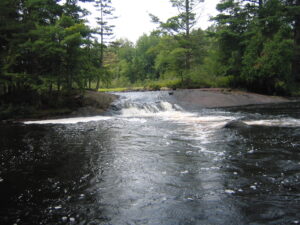 He would rent a rustic cabin, usually one that looked like it was built with Lincoln Logs, with a small kitchenette so we could cook our meals. Our favorite rental was a three room (two bedrooms and a kitchen/living/dining room) white Cape Cod-like cabin with bright red shutters; a cabin nestled in a grove of white birch trees on Little Wolf Pond. Often the centerpieces of these meals were the fish we caught from our usual fishing spots, one of which was located on the Raquette River at the Settin’ Pole Dam.
He would rent a rustic cabin, usually one that looked like it was built with Lincoln Logs, with a small kitchenette so we could cook our meals. Our favorite rental was a three room (two bedrooms and a kitchen/living/dining room) white Cape Cod-like cabin with bright red shutters; a cabin nestled in a grove of white birch trees on Little Wolf Pond. Often the centerpieces of these meals were the fish we caught from our usual fishing spots, one of which was located on the Raquette River at the Settin’ Pole Dam. 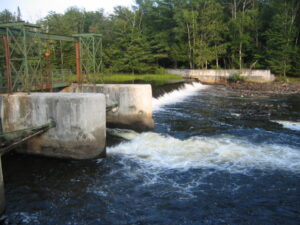 The dam had three huge, whitish gray, concrete pillars that held the gates which controlled the flow of water into the river below. We climbed over the railing and strolled, fishing rod in hand, down the metal walkway to the middle pillar and cast into the white foaming water that gushed beneath us.
The dam had three huge, whitish gray, concrete pillars that held the gates which controlled the flow of water into the river below. We climbed over the railing and strolled, fishing rod in hand, down the metal walkway to the middle pillar and cast into the white foaming water that gushed beneath us. 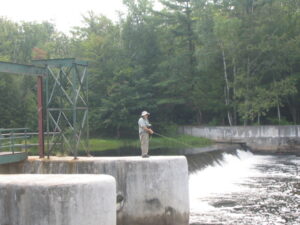
My mother was a good fisherperson and when we drove to the dam, she would be one of the first to jump out of the car, grab her fishing rod and scramble out to the middle concrete pillar of Settin’ Pole Dam. We would each use a different bait—my father liked to tempt the fish with minnows, Jimmy liked worms, though he liked playing with them more than using them to fish; my mother’s favorite tended toward big nightcrawlers, large tan-red segmented worms that my father and I gathered from our lawn the night before. I enjoyed slinging spinners. On one trip we were all getting frustrated since we knew our quarry was there, but there were no takes. My little brother Jimmy got bored easily, and walked along the river’s edge, picking up rocks and throwing them in the water. “Maybe I’ll bean one!”
My mother captured a yellowish green grasshopper and walked back to the middle pillar of Settin’ Pole Dam.

A striking close-up of a green grasshopper perched on a leaf, capturing its intricate details and textures. Generated by AI.
We watched as she baited the hook with the grasshopper and cast into the pool below. Within seconds she hauled in a nice ten inch smallmouth. We all shouted and ran into the tall grass grabbing grasshoppers and stuffing them in our shirt pockets. I carried all that we had collected and brought them out to my mother who was reeling in fish after fish, throwing most back and only keeping several for dinner. I didn’t even fish. Nor did my father. We just enjoyed watching my mother smile broadly as she hooked one fish after another, until, abruptly, suddenly, as often happens while fishing, it just stopped.
We let the rest of the grasshoppers go, Jimmy went back to throwing rocks and collecting frogs which he put in the empty bait bucket. My mother looked at my father. Her eyes implored him to find a solution. “Just need two or even just one more fish to have a nice dinner for all of us tonight.”
He looked down at his worn work shoes. “Okay. I’ll drive back into town and buy some minnows.” We all knew that minnows worked the best at Settin’ Pole Dam, but my father thought it was almost a crime against humanity to pay for bait, and silver minnows were expensive.
“Jimmy,” my dad called out, “Want to come with us to town to get minnows?”
Jimmy nodded and ran up and climbed in the back seat. My mother stayed behind. “I’ll just stay here and relax and watch the water. Don’t forget the bait bucket!” I grabbed the handle of the bait bucket and climbed into the dark brown Nash. Twenty minutes later we were in front of Galloway’s Bait Store. It wasn’t really a store in the conventional sense. The structure was someone’s home, a large grayish white two story frame.

Home architecture design in Modern Style with Minimalist design constructed by Glass and Steel material. Mid-Century modern design. Generative AI AIG25 .
All the bait was in the backyard, stored in several checkerboard-like square concrete pools, each pool containing a different bait. Narrow walkways separated the pools.
My father knocked on the front door, and Mrs. Galloway remembered us from previous visits. She was a tall, fortyish, matronly woman wearing a gray house dress with a yellow tulip pattern and a white sweater draped on her shoulders. She stood atop two banana yellow high heels laced with brown bows. Her reading glasses perched on the top of her dark brown hair. “Hi, fellas, come on in. What can I getcha?”
My father struggled mightily to get the words out. “Two dozen minnows, please?”
“What size?”
My father looked down at me, then at Mrs. Galloway. “Medium.”
“Well good! I can fix you up.”
“Give me your bait bucket. Two dozen you say? Medium?”
I handed her the bait bucket. “Yes, Ma’am.”“Fine. Follow me!” We followed her through the hallway, past her living room, through her kitchen and out the back. In one swift motion she opened the screen door and grabbed a small net off a kitchen hook. In the back yard were several concrete troughs laid out like small, narrow swimming pools. To access any one pool, Mrs. Galloway would have to walk on a narrow walkway between troughs holding different size minnows
| Crawfish | Medium Minnows | Small Minnows | |||
| Hellgrammites | Larger Minnows | Small Minnows | |||
| Big Minnows | Big Minnows | Big Minnows |
Then she turned to face us. “What size do you want?” She had forgotten our order from thirty seconds earlier.
“Medium.” My father’s voice was barely a whisper.
“Fine. How many you want?”
More tightness in his voice. “Two dozen.”.
Mrs. Galloway gracefully stepped out of her banana yellow shoes and gingerly stepped into the matrix of concrete pools, negotiating the narrow walkway past the pool with large minnows which was opposite the pool filled with even bigger minnows. What happened next is duly recorded in my book, Mahogany Jim and the Nightcrawlers and Other Tales, and I will relate it here.
I watched as the lady in the gray house dress negotiated the narrow walkways between pools, net in right hand, bait bucket in left, a tightrope balancing act admired by Mahogany Jim and me. Even my brother Jimmy was watching her progress, his hands folded behind his back.
The lady turned to face us. “What size do you want?” Mahogany Jim looked at me. “Sometimes bass prefer the smaller size.”
I shrugged my shoulders. “Big bait, big fish.”
It was not the answer Mahogany Jim wanted. He turned toward the lady in the gray house dress. “Medium.”
She nodded, turned around, put the bait bucket down on the narrow concrete pathway, and dipped her net into a concrete trough. Up came a netful of medium sized shiners. She stooped over to dump the load into the bucket, opened the lid, and out jumped one of Jimmy’s captive frogs,

arms and legs outstretched leaping toward the face of the lady in the gray house dress. Scream. The bucket went into the pool on the right, the netful of shiners went up in the air and into the pool on the left, (and were quickly gobbled in midair by the larger of their species) and the lady in the gray house dress went backwards into the pool behind her. I think it was the trough with crayfish.
Frozen, it took a while for Mahogany Jim and me to spring into action, walk the narrow concrete pathways and help Mrs. Galloway out of the trough and onto the pathway with her hair hanging like a mop on her shoulders, her wet dress clinging to her body and an angry look on her face that would have stopped a charging rhino at five paces. She had a difficult time stepping out of the pool, despite, or perhaps because of, our help. She may have slipped back into the pool once or twice.
Jimmy remained by the back porch, hands still folded behind his back, smiling.
Following our “rescue,” Mrs. Galloway brushed past us and into the house. Mahogany Jim theorized that discretion dictated we not finish our negotiation. I retrieved the bait bucket. We slunk back to the Ford and drove back to Settin’ Pole Dam where my mother waited for the minnows.
As we got out of the car, I brought the empty bait bucket with me. My mother looked at the swinging and obviously empty pail, spread her arms as if to ask, “So? Where are the minnows?”
My father walked up to the dam. “The bait store was all out.”
Polley and I drove past Mrs. Galloway’s house, graying like the color of the overcast sky. I could see crab grass and dandelions with pale yellow drooping heads growing in the bait troughs.
There was no traffic as we moved silently and slowly down Main Street,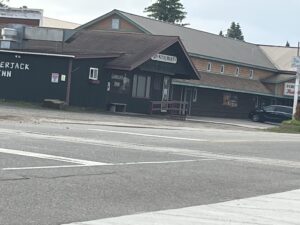
past the Lumberjack Restaurant, shuttered with pale brown moldy plywood and permanently closed for business. Its emptiness hurt. Covid and poor decisions by people who really tried to revive the area created a ghost town fog that shrouded our old haunts.
Just past the Lumberjack we made a right to enter Little Wolf Pond and drove down to where our red and white cabin used to be. It had been “shabbified.” The house next to it also felt the malaise that affected the area.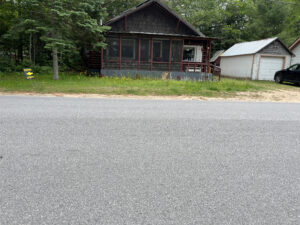
We continued on Route 3 West past the entrance to Little Wolf Lake and made the left onto the dirt road leading to Settin’ Pole Dam. The County, to keep people safe from falling off the dam, put a chain link fence around the entrance to the pillars from which we had fished. 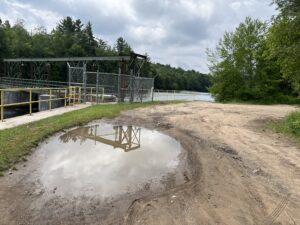 I felt that same fence around my heart. I stared for a long while at the dam, the river, and the sky.
I felt that same fence around my heart. I stared for a long while at the dam, the river, and the sky.
I have learned in my seventies that Thomas Wolfe was right. You Can’t Go Home Again. The dam was just a dam, the fence just a fence, the river just flowing water. “Home” is not a place. It is a memory. And my memory is limited to thoughts. I have reached the age when the ghosts have fled the haunts of my youth. Even the ghosts have to leave the physical place, as fewer live relatives and friends visit those sacred places where life was lived and enjoyed. Without the ghosts the place is just a geographic entry…a latitude and longitude. But in my mind I still see my father, my mother, and my brother enjoying the glory of being together at Settin’ Pole Dam. I can recall conversations.  I can picture movements and facial expressions, smiles and frowns and laughs. I can think the memory. But visiting the past in space is not sufficient. Something is missing. I cannot feel the memory. I cannot feel in my body and soul the joys of my youth.
I can picture movements and facial expressions, smiles and frowns and laughs. I can think the memory. But visiting the past in space is not sufficient. Something is missing. I cannot feel the memory. I cannot feel in my body and soul the joys of my youth.
And so that is another lesson that can be learned by old people. In fact, it is a revelation that only old people can learn. In the near future, I will be a forgotten ghost to my offspring. I wish them the wisdom to cherish memories of their youth and to value those around them, to understand that, if we are fortunate, life is the effort to create good and meaningful memories. The best I can do is feel as much of the present as I can.
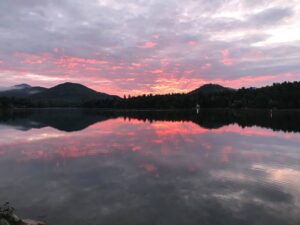


This is ET Test Comment.
It appears you had as much fun writing this as I did reading it.